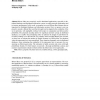Free Online Productivity Tools
i2Speak
i2Symbol
i2OCR
iTex2Img
iWeb2Print
iWeb2Shot
i2Type
iPdf2Split
iPdf2Merge
i2Bopomofo
i2Arabic
i2Style
i2Image
i2PDF
iLatex2Rtf
Sci2ools
DPD
2010
2010
Cardinality estimation and dynamic length adaptation for Bloom filters
Abstract Bloom filters are extensively used in distributed applications, especially in distributed databases and distributed information systems, to reduce network requirements and to increase performance. In this work, we propose two novel Bloom filter features that are important for distributed databases and information systems. First, we present a new approach to encode a Bloom filter such that its length can be adapted to the cardinality of the set it represents, with negligible overhead with respect to computation and false positive probability. The proposed encoding allows for significant network savings in distributed databases, as it enables the participating nodes to optimize the length of each Bloom filter before sending it over the network, for example, when executing Bloom joins. Second, we show how to estimate the number of distinct elements in a Bloom filter, for situations where the represented set is not materialized. These situations frequently arise in distributed dat...
| Added | 02 Mar 2011 |
| Updated | 02 Mar 2011 |
| Type | Journal |
| Year | 2010 |
| Where | DPD |
| Authors | Odysseas Papapetrou, Wolf Siberski, Wolfgang Nejdl |
Comments (0)

